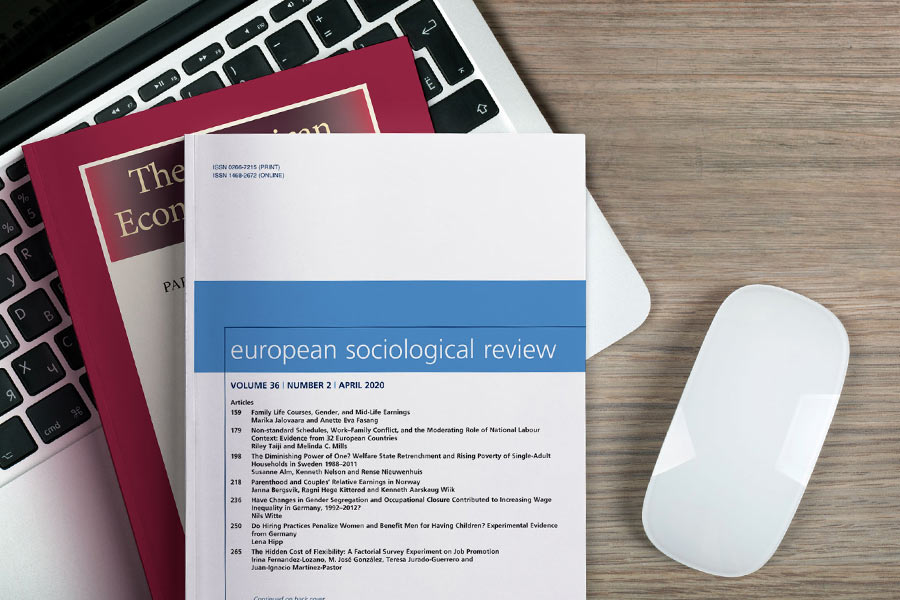Total hits 17.450
-
Study "From school to work" : Project info 1: occupational orientation at the beginning of final year
Abraham, M., Dietrich, H., Sachse, H. & Schels, B. (2012): Studie "Von der Schule in den Beruf". Projektinfo 1: Berufliche Orientierung zu Beginn des Abschlussjahres. Nürnberg, 4 p.
-
Trade unions can bridge the gap between governments and the market to increase both the production and welfare of workers
Hauptmann, A. (2012): Trade unions can bridge the gap between governments and the market to increase both the production and welfare of workers. In: Europp. European Politics and Policy No. 30.10.2012, p. 1-3.
-
Mythen der Arbeit: Die Zeit der Vollbeschäftigung kommt nie wieder - stimmt's?
Möller, J. (2012): Mythen der Arbeit: Die Zeit der Vollbeschäftigung kommt nie wieder - stimmt's? In: Spiegel Online No. 30.10.2012, o. Sz.
-
Der Bedarf an Pflegefachkräften und Strategien für deren Gewinnung
Pohl, C. & Sieglen, G. (2012): Der Bedarf an Pflegefachkräften und Strategien für deren Gewinnung. In: Archiv für Wissenschaft und Praxis der sozialen Arbeit, Vol. 43, No. 4, p. 40-49.
-
Educational attainment and family-related employment interruptions in Germany
Drasch, K. (2013): Educational attainment and family-related employment interruptions in Germany. Do changing institutional settings matter? In: European Sociological Review, Vol. 29, No. 5, p. 981-995. DOI:10.1093/esr/jcs076
-
The impact of activity chaining on the duration of daily activities
Brunow, S. & Gründer, M. (2013): The impact of activity chaining on the duration of daily activities. In: Transportation, Vol. 40, No. 5, p. 981-1001. DOI:10.1007/s11116-012-9441-6
-
Neue Typisierung: Regionale Ausbildungsmärkte verändern sich
Kleinert, C. & Kruppe, T. (2012): Neue Typisierung: Regionale Ausbildungsmärkte verändern sich. (IAB-Kurzbericht 17/2012), Nürnberg, 8 p.
-
Industrial structure and regional employment dynamics
Dauth, W. (2012): Industrial structure and regional employment dynamics. (IAB-Bibliothek 335), Bielefeld: Bertelsmann, 131 p. DOI:10.3278/300781w
-
Development of vacant jobs: the interaction of the economic situation and structures
Kettner, A. & Klinger, S. (2012): Entwicklung der offenen Stellen: Überlagerung von Konjunktur und Struktur. In: Wirtschaftsdienst, Vol. 92, No. 10, p. 712-714.
-
Investments in education and welfare in a two-sector, random matching economy
Mendolicchio, C., Paolini, D. & Pietra, T. (2012): Investments in education and welfare in a two-sector, random matching economy. In: Journal of Mathematical Economics, Vol. 48, No. 6, p. 367-385. DOI:10.1016/j.jmateco.2012.08.002
-
Estimating the wage premium of collective wage contracts
Gürtzgen, N. (2012): Estimating the wage premium of collective wage contracts. Evidence from longitudinal linked employer-employee data. (ZEW discussion paper 2012-073), Mannheim, 38 p.
-
Returns on education in West European countries
Mendolicchio, C. (2012): Returns on education in West European countries. In: Reflets et perspectives de la vie économique No. 03/2012, p. 73-83. DOI:10.3917/rpve.513.0073
-
Deutschland im internationalen Vergleich
Sproß, C. & Trübswetter, P. (2012): Deutschland im internationalen Vergleich. In: H. Brücker, S. Klinger, J. Möller & U. Walwei (Hrsg.) (2012): Handbuch Arbeitsmarkt 2013 : Analysen, Daten, Fakten (IAB-Bibliothek, 334), p. Anhang 62-99. DOI:10.3278/300776W061
-
Entwicklung und Perspektiven des deutschen Arbeitsmarktes
Bellmann, L., Blien, U., Crimmann, A., Dieterich, I., Dietz, M., Ellguth, P., Feil, M., Fuchs, J., Fuchs, M., Fuchs, S., Gerner, H., Hecht, V., Hummel, M., Klinger, S., Kohaut, S., Konle-Seidl, R., Kruppe, T., Ludewig, O., Rhein, T., Rothe, T., Scholz, T., Schwengler, B., Spitznagel, E., Stops, M. & Walwei, U., Wanger, S., Zika, G., Weyh, A. & Zapf, I. (Mitverf.) (2012): Entwicklung und Perspektiven des deutschen Arbeitsmarktes. In: H. Brücker, S. Klinger, J. Möller & U. Walwei (Hrsg.) (2012): Handbuch Arbeitsmarkt 2013 : Analysen, Daten, Fakten (IAB-Bibliothek, 334), p. 13-92. DOI:10.3278/300776w013
-
Zentrale Indikatoren des deutschen Arbeitsmarktes
Kaufmann, K., Hummel, M. & Rudolph, H. (2012): Zentrale Indikatoren des deutschen Arbeitsmarktes. In: H. Brücker, S. Klinger, J. Möller & U. Walwei (Hrsg.) (2012): Handbuch Arbeitsmarkt 2013 : Analysen, Daten, Fakten (IAB-Bibliothek, 334), p. Anhang 4-60. DOI:10.3278/300776W003
-
Handbuch Arbeitsmarkt 2013
Brücker, H., Klinger, S., Möller, J. & Walwei, U. (2012): Handbuch Arbeitsmarkt 2013. Analysen, Daten, Fakten. Vorwort. In: H. Brücker, S. Klinger, J. Möller & U. Walwei (Hrsg.) (2012): Handbuch Arbeitsmarkt 2013 : Analysen, Daten, Fakten (IAB-Bibliothek, 334), p. 5-7. DOI:10.3278/300776w
-
Zur Einführung eines gesetzlichen Mindestlohns im öffentlichen Dienst in Thüringen
Fuchs, M., König, M., Kropp, P. & Möller, J. (2012): Zur Einführung eines gesetzlichen Mindestlohns im öffentlichen Dienst in Thüringen. Wirkung und Ausgestaltung von allgemeinen, branchen- und regionalspezifischen Mindestlöhnen. Schriftliche Anhörung des Haushalts- und Finanzausschusses des Thüringer Landtags. (IAB-Stellungnahme 05/2012), Nürnberg, 14 p.
-
Labour market handbook 2013 : Analyses, data, facts
Brücker, H., Klinger, S., Möller, J. & Walwei, U. (eds.) (2012): Handbuch Arbeitsmarkt 2013. Analysen, Daten, Fakten. (IAB-Bibliothek 334), Bielefeld: Bertelsmann, 307 p., CD-ROM. DOI:10.3278/300776w
-
Übergänge am Arbeitsmarkt und Qualität von Beschäftigung
Achatz, J., Bruckmeier, K., Buch, T., Burkert, C., Dietrich, H., Dietz, M., Garloff, A., Gundert, S., Hell, S., Hohendanner, C., Jahn, E., Kleinert, C., Koller, L., Lehmer, F., Matthes, B., Niebuhr, A., Schels, B., Trappmann, M., Walwei, U., Wapler, R. & Ziegler, K. (2012): Übergänge am Arbeitsmarkt und Qualität von Beschäftigung. In: H. Brücker, S. Klinger, J. Möller & U. Walwei (Hrsg.) (2012): Handbuch Arbeitsmarkt 2013 : Analysen, Daten, Fakten (IAB-Bibliothek, 334), p. 141-203. DOI:10.3278/300776W141
-
Fachkräftebedarf: Analyse und Handlungsstrategien
Brücker, H., Christoph, B., Dietz, M., Fuchs, J., Fuchs, S., Haas, A., Hummel, M., Jahn, D., Kleinert, C., Kruppe, T., Kubis, A., Leber, U., Müller, A., Osiander, C., Schmerer, H., Söhnlein, D., Spitznagel, E., Stabler, J., Stegmaier, J., Walwei, U., Wanger, S., Wapler, R., Weber, B., Weber, E. & Zika, G. (2012): Fachkräftebedarf: Analyse und Handlungsstrategien. In: H. Brücker, S. Klinger, J. Möller & U. Walwei (Hrsg.) (2012): Handbuch Arbeitsmarkt 2013 : Analysen, Daten, Fakten (IAB-Bibliothek, 334), p. 205-290. DOI:10.3278/300776W205



